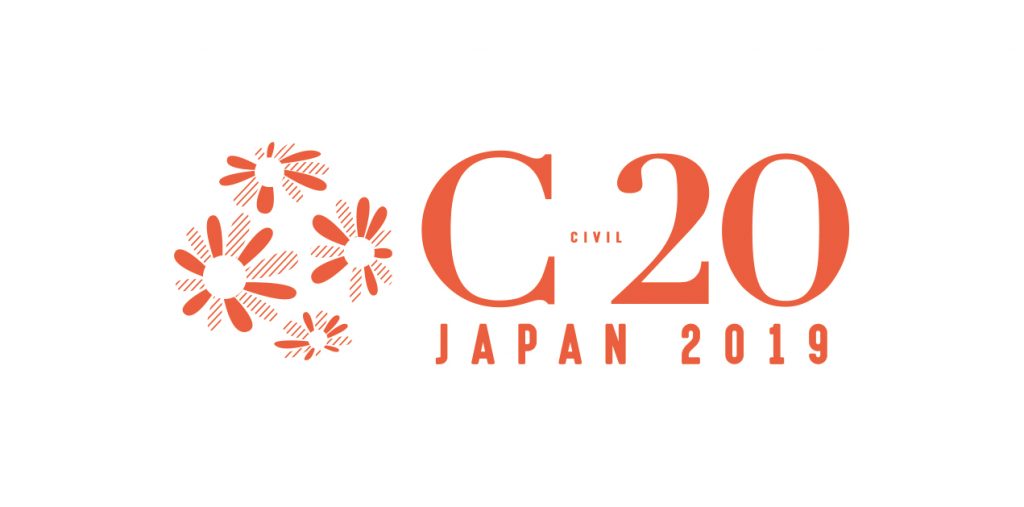EVENT
Draft Agenda of C20 Summit is out now (21-23 April)

Day 1–Sun, 21 April 2019
“Tokyo Democracy Forum” at Sacred Heart Institute for Sustainable Futures
| 8:30-9:00 | Registration |
| 9:00-9:40 | Opening |
| 9:40-11:10 | Plenary Session: Why is Transparency so Important for Democratic Governance? |
| 11:20-13:00 |
1st Breakout Session (*4 sessions in parallel) Session 1A: Civic Space in Asia Session 1B: Inclusive Democracies: Gender, Sexuality and Equal Participation Session 1C: Corruption and Democratic Governance Session 1D: The Missing Billions & Its Impact on African Citizens: A look at the impact of illicit financial flows in 6 African countries |
| 13:00–14:00 | Lunch |
| 14:00–15:40 |
2nd Breakout Session (*3 sessions in parallel) Session 2A: Financial and Security Constraints for CSOs Session 2B: Science, Technology and Civil Society Session 2C: SDG16.2 – Violence against Children |
| 15:40–16:20 |
Coffee Break |
| 16:20–17:30 |
Closing Session |
| 17:45–19:30 | Reception |
Day 2–Mon, 22 April 2019 at Toranomon Hills Forum
| 8:30-9:00 | Registration |
| 9:00-9:30 | Reflection of Day 1 |
| 9:30–10:30 | Special Session: Submission of C20 Policy Pack to G20 Presidency |
| 10:30–12:00 | High Level Panel with G20 Sherpa Track |
| 12:00–12:30 | Keynote Speech |
| 12:30–13:30 | Lunch |
| 13:30–15:00 |
3rd Breakout Sessions (*4 sessions in parallel) Session 3A: Roles of G20 in Education Financing This session contributes to discussion on Human Capital Investment Initiative which is one of the agenda at Development Working Group in G20 this year. We would like to make the Initiative to be adopted by G20 to be more rights-based, equitable and inclusive one. The session also contributes to discussion on Education for Creating Session 3B: SDGs Funding and Use of it: International Solidarity Levy and UNITAID In order to achieve the SDGs, a huge funding gap exists and we need to fill the gap. To this end, it is necessary to discuss innovative financing, including International Solidarity Levy, which is another public fund, in addition, we would like to link with the Summit Agenda by introducing the successful efforts in the global health field of UNITAID where funds are being used. Session 3C: Responsible Business Conduct: The Road Ahead (*This session is held in English only) As organizations rethink their business models-redesigning work to leverage the power of technology and adjusting to a rapidly changing world-it becomes increasingly clear that they cannot succeed without making people a priority. Human talent, not capital or technology, is the link between innovation, competitiveness and growth in the 21st century. Session 3D: Conflict Affected Communities and Global Growth This session will show the barriers that conflict affected communities have to economic growth, rebuilding infrastructure and recovering from conflict as a result of explosive contamination. Further, the need for partnerships to end the threat of landmines across the globe will be highlighted, and it will aim to raise awareness that increased engagement by Japan’s government, civil sector and private sector in Mine Action could lead to many countries declaring themselves landmine free by 2025. |
| 15:00–15:30 | Coffee Break |
| 15:30–17:00 |
4th Breakout Sessions (*3 sessions in parallel) Session 4A: Key Issues for G20 on Environment, Climate and Energy The session highlights key environmental issues that G20 countries has to face and tackle with. These include issues of climate change, energy transition, biodiversity and marine plastic waste. In the sessions, speakers present C20 views for G20, Japan’s role, energy transition pathway and how to move away from fossil fuels toward decaronization by 2050, and issue of marine plastic waste. Session 4B: “Leave No One Behind” in the strive for UHC – a fantasy or reality? To make known various groups of people who are “left behind” from current health systems, and highlight the barriers faced and reality in accessing affordable quality health information and services. The session will discuss ways in which G20 governments can ensure that their national policies and programs on UHC encompass the needs of these marginalized key populations areas and health facilities create environments that are free of stigma and discrimination. With global intergovernmental and institutional discussions on tax reform moving at an increasingly fast pace, it is critical that the solutions have broad based support and active advocacy across stakeholders. This workshop will ensure civil society, trade union and policy advocates engaged in tax policy have a good understanding of the principled solutions, proposed by ICRICT. |
| 17:00–17:30 | Wrap-up of Day 2 |
| 17:45–19:45 | Reception |
Day 3–Tue, 23 April 2019 at Toranomon Hills Forum
| 8:30-9:00 | Registration |
| 9:00-9:15 | Reflection of Day 2 |
| 9:15-10:00 | Messages from Engagement Groups |
| 10:00–11:30 | High Level Panel with G20 Finance Track |
| 11:30–12:00 | Keynote Speech |
| 12:00–13:00 | Lunch |
| 13:00–14:30 |
5th Breakout Sessions (*3 sessions in parallel) Session 5A: Eliminating Violence and Harassment in the World of Work Session 5B: Responsible Investments for Quality Infrastructure Session 5C: How Can We Make Trade & Investment Sustainable and Based on Social Justice and Democracy? |
| 14:30-15:00 | Coffee Break |
| 15:00-16:30 | Closing Session: Future of Civil Society, Continuity of C20 and Remarks by C20 Chair & Co-Chair |
*All the items are subject to change.
*Click here to view in PDF.
